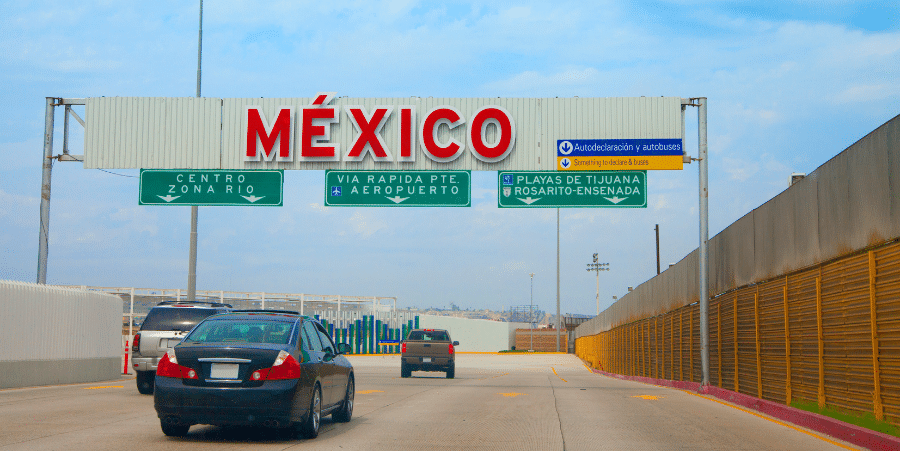Is It Safe to go to Tijuana for Bariatric Surgery? Every years thousands of people undergo bariatric surgery in Mexico, and often ask themselves: Is It Safe to go to Tijuana for Bariatric Surgery?
Despite what you may hear, Tijuana is incredible safe for gastric sleeve or bariatric surgery.
Tijuana is incredible safe for patients travel for bariatric surgery. Renew Bariatrics uses its own transportation, hospital and hotel network to host thousands of successful surgeries every year.
While many patient’s friends of family inquire about the physical safety of Tijuana for bariatric patients – it’s important to note that Tijuana is incredibly safe to visit as Tijuana / San Diego is the busiest border crossing in the entire World. An estimated 50 million people cross yearly.
Renew Bariatrics’ estimates that roughly between 10,000-20,000 patients undergo bariatric surgery per year in Mexico, with the majority of them coming to Tijuana, Mexico.
Currently the US State Department advises those not to visit the tourist areas of Tijuana (September 2023). Within our network, you’ll only travel to approved areas of Tijuana. Our hospitals have security and only provide services to medical tourism patients.
The biggest safety risks when traveling to Tijuana is engaging in illegal activities, traveling to non-tourist areas, and going to casinos or bars (especially late at night). All of which is not allowed with Renew Bariatrics.
Tijuana’s Overall Crime and Safety Situation
Petty Crime
Tijuana, a sprawling metropolitan city, grapples with a range of crime threats, a common challenge in rapidly growing urban areas. As with many large, densely populated cities, Tijuana experiences frequent incidents of street crimes such as purse snatching and pickpocketing. These types of crimes are particularly prevalent in areas where large crowds gather, including public transportation hubs, bustling marketplaces, and popular tourist attractions. The city’s vibrant streets and busy public spaces provide an ideal environment for these petty criminals to operate.
In Tijuana, these street criminals often work in small groups or pairs, employing various tactics to distract and deceive their targets. They typically focus on individuals who appear inattentive, distracted by their surroundings, or those who are visibly tourists. People displaying expensive jewelry, carrying high-end electronics, or showing large amounts of cash are especially at risk. These criminals are adept at identifying and exploiting vulnerabilities, whether it’s someone engrossed in their phone, a tourist navigating a crowded area, or an individual unfamiliar with the city’s dynamics.
The issue is further compounded by the fact that these crimes are often opportunistic, making them difficult to predict and prevent. Tourists, in particular, can be easy targets due to their unfamiliarity with the area and tendency to carry valuables. The local law enforcement in Tijuana is aware of these challenges and often advises visitors and residents to remain vigilant, minimize the display of wealth, and be aware of their surroundings, especially in crowded or less secure areas.
Drug-Related Violence
Another type of criminal activity that is prevalent in Tijuana is the human smuggling and narcotics trafficking. Mexico serves as the primary route for smugglers transporting illegal drugs into the U.S. with Tijuana being an ideal gateway into Southern California.
Drug-related violence is an ordinary way of life as organized crime is carried out almost on a daily basis by criminal organizations. For the most part, however, the drug-related violence is confined to those who are directly involved in the drug trade. This, nevertheless, does not remove the risk of innocent bystanders getting caught in the crossfire.
The prevalence of rival drug cartels in Tijuana typically results in turf wars and in-fighting within the cartels themselves leads to further insecurity in the area. Also, the rise of criminal deportees from the U.S to Tijuana exacerbates the problem since without work; these deportees are forced to work with the local criminal organizations.
2016 witnessed an increase in public displays of violence mainly in the form of homicides related to cartel rivalries and power struggles. There is also a growing demand for the cheap and highly addictive synthetic drug known as methamphetamine which causes rampant infighting among street-level dealers and even an unrestricted flow of illegal firearms from the U.S. There has been a slight decrease in reported assaults but an increase in robberies as compared with 2015.
This year, however, more than 1,025 people have so far lost their lives in drug-related violence which has already exceeded last year’s total of 910 victims. This surge has overwhelmed homicide investigators with almost nine out of ten cases remaining unsolved.
Cybersecurity Issues
Cybercrime has been escalating in recent years, with a notable increase in incidents involving credit and debit card fraud. This trend highlights a growing concern in the digital age, where personal financial information is increasingly vulnerable to unauthorized access and misuse. The surge in such crimes is not limited to individual consumers; it also encompasses larger, more organized attacks. The primary targets of these cyber attacks have predominantly been government agencies and private corporations.
These entities, due to their vast repositories of sensitive data and financial information, present lucrative targets for cybercriminals. The attacks on these organizations not only compromise national security and corporate secrets but also put the personal information of millions of individuals at risk. This situation underscores the urgent need for enhanced cybersecurity measures and more robust protection protocols to safeguard against these evolving digital threats.
Other Areas of Concern
There is a higher presence of criminal intent in bars, nightclubs, and casinos in Tijuana, especially after dark. Particular areas that visitors should avoid include the old Zona Centro which is commonly known as the red light district.
Caution should also be taken when visiting Playas de Tijuana after dark, and it is highly discouraged to travel on remote roads and isolated highways after darkness that is not frequently patrolled by police.

Tijuana’s Transportation Safety Situation
With Renew Bariatrics, you’ll be using our dedicated transportation network to shuttle between San Diego and Tijuana and within Tijuana.
Road Conditions and Road Safety
Travelers are advised to use the toll roads rather than the less secure free roads as much as possible and in addition to avoiding night travel. There have also been fuel shortages in Baja California, so it is prudent to maintain a half tank of fuel when going on extended trips.
Public Transportation
Public transportation tends to be riskier than private transit due to the full nature of travel which makes individuals more prone to petty crime. Private transportation services such as Uber is encouraged, and it is prudent to avoid cab companies who pick additional passenger en-route.
Airport Transportation
Tijuana’s main airport is relatively modern, and it is a 10-minute drive from the Otay Mesa Border Crossing. The Cross Border Xpress (CBX) is a pedestrian bridge that is enclosed for Tijuana Airport passengers crossing the U.S./Mexico border. This enclosed bridge helps travelers avoid massive delays at the Otay Mesa and San Ysidro land ports of entry.
Travelers who use this bridge can access more than 30 destinations in Mexico from the Tijuana Airport that are not served by other southern California airports. The use of established cabs from a kiosk is highly recommended when leaving the airport.
Travelers should not hitchhike or accept rides or give rides to strangers when traveling. Also, avoid walking alone along sparsely frequented trails, ruins or beaches.
Terrorism Threat
Tijuana is perceived as a low-terrorism threat location with no known active terrorist groups. However, Mexico as a country is a potentially attractive hub for transnational terrorists due to the lax immigration controls and ease of obtaining fake Mexican travel documentation.
Protests
There are typically minimal cases of political violence directed towards foreigners although in January of this year there have been well-attended protests in Tijuana and other municipalities revolving around increasing gas prices and Mexico domestic issues.
Civil Unrest
The primary cause of civil unrest is the government’s ongoing conflict with the organized criminal organizations which does give rise to public demonstrations and protests. The protest activity in January caused border closures and disrupted access to fuel causing significant traffic delays. Travelers are encouraged to avoid protest activity due to the ever-present danger of a peaceful demonstration turning violent.
Environmental Hazards
In 2016, there were no significant earthquakes in Tijuana although the possibility does remain high due to its proximity to the San Andreas Fault Line. Residents and visitors are encouraged to keep abreast of weather conditions when traveling through the peninsula. Heavy rainfall also has the potential for causing flooding in both urban and rural areas.
Kidnapping Threat
Kidnapping for ransom is a widespread criminal activity with unofficial estimates ranging from 600 to 5,000 kidnapping levels per year. In most scenarios, the payment is paid and the victim released. The police are typically not called in due to the common belief that they are involved or are unable to remedy the situation. Many wealthy residents in Tijuana have bodyguards and armored vehicles to protect their families against kidnapping.
Another form of kidnapping is known as virtual/telephonic kidnapping whereby prison inmates use smuggled phones to call potential victims to extort payments. They typically tend to pose as law enforcement and demand payments for the supposed release of a family member or supposedly forestall a kidnapping. Many of these calls are baseless, and it is always prudent to attempt and contact the family member as soon as possible.
Our Commitment to Your Safety
Here at Renew Bariatrics we have established a comprehensive and integrated system to facilitate thousands of successful surgeries each year. This system is unique in its utilization of a dedicated transportation network, a specialized hospital infrastructure, and a closely linked chain of hotels, all of which are designed to cater specifically to the needs of our patients.
The transportation network provided by Renew Bariatrics is tailored to ensure safe and comfortable travel for patients. This includes the journey from their arrival point, often an airport, to the hospital, and subsequently to the hotel where our patients recuperate post-surgery. This seamless transportation arrangement is crucial for patients who are dealing with the physical and emotional stress of undergoing major surgery.
The hospitals we use are equipped with state-of-the-art medical facilities, staffed by experienced healthcare professionals who specialize in bariatric surgery. These hospitals are not just centers for surgical excellence but are also designed with the comfort and specific needs of bariatric patients in mind, ensuring a conducive environment for recovery.
We extend our specialized care to the postoperative phase through a network of hotels. These hotels are selected for their proximity to medical facilities and for their ability to provide a comfortable, stress-free environment for recovery.
This integrated approach, combining transportation, hospital care, and postoperative recuperation facilities, reflects our commitment to providing a holistic and patient-centered experience.
Renew Bariatrics is a weight loss surgery provider located in Tijuana, Mexico. We are here to make sure your trip to Tijuana is safe and successful with our expert team of bariatric surgeons and world-class care. Talk to our staff today or call 844-736-3963 to learn more.


